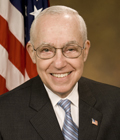Twice in two days last week, US Attorney General Robert Mukasey lashed out at the US Sentencing Commission's December decision to apply cuts in federal crack sentences to prisoners currently behind bars, warning last Thursday that they could spark an increase in violent crime and suggesting the following day he may try to block the releases.

Still, speaking before the US Conference of Mayors last Thursday, Mukasey warned that some 1,600 convicted crack offenders, "many of them violent gang members," could be released as early as March. "Before we take that step, we need to think long and hard about whether that's the best way to go about this -- whether it best serves the interests of justice and public safety," Mukasey said. "A sudden influx of criminals from federal prison into your communities could lead to a surge in new victims with a tragic but predictable result."
Jurists and sentencing reform analysts contacted by the Los Angeles Times were quick to criticize Mukasey's remarks. "In the grand sweep of the nation's criminal justice system, the release of this minuscule number of prisoners will not affect crime rates. It will, however, significantly improve the perceived fairness of our federal criminal justice system," said Paul Cassell, a professor at the University of Utah law school and prominent conservative, noting that no prisoner would be released early unless a judge found he was not a threat to the community. "All of these prisoners were going to be released in the future," Cassell said, "so the retroactivity provision simply provides a slight acceleration of their release date."
Mukasey's numbers are misleading, said Marc Mauer, executive director of the Sentencing Project. "About 700,000 people are coming out of prison this year, many of whom were convicted of a violent offense. So now the change means we'll have 701,600 instead. Seems like he's kind of missing the point," said Mauer.
Criticism notwithstanding, Mukasey was back at it again last Friday. In a press briefing, he said that the Justice Department may try to block the sentencing guideline reforms that will lead to the early releases. "We're going to try to do whatever we can to mitigate it," Mukasey said. "We would obviously like to see something done about something that we think was unwise in the first place." The department could suggest legislation to block it, he said, although he acknowledged it could be hard to pass in the Democratic Congress.
"Many of those [defendants eligible for release] were involved in violence, and can be expected to continue after they get out," Mukasey told reporters. He reiterated his comments from the previous day that he was concerned the early release prisoners might not have received job training and drug treatment. "None of that will have happened, or a lot of it will not have happened, by the time some of these folks get out," he said. "And that's a cause of anxiety."
Douglas Berman, professor of law at Ohio State University and publisher of the Sentencing Law and Policy blog, speculated, "I suspect AG Mukasey is now being 'unusually outspoken' primarily to influence federal district judges as they consider motions for crack sentencing modifications. As the AG knows, no defendant will get a reduced sentence without judicial approval. During the post-Booker period, tough talk by DOJ has led judges to be particularly cautious about lenient sentences that might become 'tough-on-crime' political talking points. I suspect that the AG and main Justice hope that tough talk about going to Congress might make it easier for local federal prosecutors to oppose sentence reductions in individual cases."
This work by StoptheDrugWar.org is licensed under Creative Commons Attribution-ShareAlike 4.0 International
Comments
The chickens are coming home to roost
And they've mutated into carnivores.
This is the end result when you try to incarcerate your way out of a social problem, and then run out of money to do so. This is as much a fiscal matter as it a social one, but the prohibitionists thought the money would always be there to feed their voraciously hungry pet DrugWar. They forgot about 'boom-and-bust' cycles, and how that would also affect the enforcement of their precious drug laws. The wolf is at the door now, and we can't keep running the prison/industrial complex anymore, as the only people profiting from it are those whose lips are clamped tight to the DrugWar teat. For everyone else, it is a net loss. And this is the result.
The Drug War---mass producing crime, criminals and violence
What will it take for drug warring morons to realize they've created every problem they say they want to solve? They learned nothing from Prohibition 1! They incarcerate and ruin the lives of innocent folk, and especially blacks and Hispanics, for truly victimless "drug crimes" and then expect them to be reformed after a long stint in a college of higher criminality-- prison. Drug warriors and prohibitionists are as close to brain dead as the living can get.
What surprises me is that the millions who have suffered the consequences of drug war insanity aren't out there shooting, killing, and destroying the likes of Souder, Mukassy, Walters, and their evil mindless ilk!
Go Figure
Maybe the victims of the drug war aren't as violent as they've been made out to be by those like the likes of Souder, Mukassy, Walters, & the rest of the minions of drug warriors -- ya think?
Smoking Crack is Violent?
Gee, I've smoked crack before and I never hurt anyone. Oh, well, Live and learn.
Add new comment